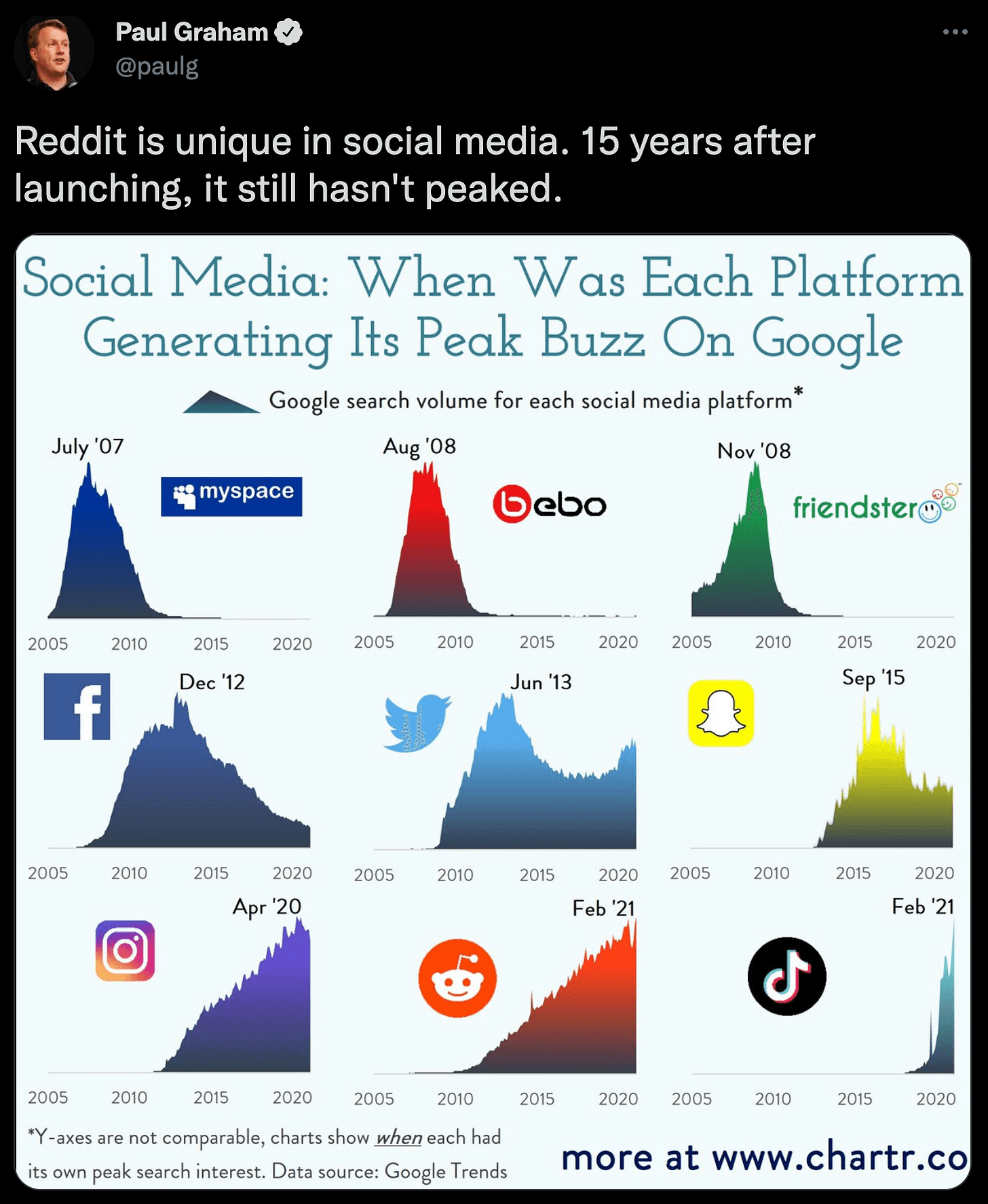The Long Game 93: New Theses on Sleep, Behavioral Activation, Going Back to the Fundamentals
🎥 Kanye West, Germany & Ukraine, Strength Standards, Love, Tim Urban, Beautiful Neighbourhoods, and Much More!
Hi there, it’s Mehdi Yacoubi, co-founder at Vital, and this is The Long Game Newsletter. To receive it in your inbox each week, subscribe here:
In this episode, we explore:
New theses on sleep
Behavioral activation
Google Search Is Dying
On goals, advice, and life
The Kanye West Documentary
Going back to the fundamentals
Let’s dive in!
🥑 Health
💤 Theses on Sleep & Being Open-Minded
I really liked Alexey Guzey’s Theses on Sleep article. I have no idea whether he’s right or wrong (although I’d predict he’s right on a couple of things) but what I liked is the challenging of scientific facts.
It’s key to remember that the half-life of a scientific fact is around 45 years. It means a lot of what we believe true today will end up being false. How will we find out what’s false if we adopt the “Trust the Science™” mindset? There is no such thing as trusting the “Science.” It’s about trusting the scientific process, and the scientific method is about proving your hypotheses with verifiable facts and replicable experiments.
Here’s the summary
Summary: In this essay, I question some of the consensus beliefs about sleep, such as the need for at least 7 hours of sleep for adults, harmfulness of acute sleep deprivation, and harmfulness of long-term sleep deprivation and our inability to adapt to it.
It appears that the evidence for all of these beliefs is much weaker than sleep scientists and public health experts want us to believe. In particular, I conclude that it’s plausible that at least acute sleep deprivation is not only not harmful but beneficial in some contexts and that it’s that we are able to adapt to long-term sleep deprivation.
I also discuss the bidirectional relationship of sleep and mania/depression and the costs of unnecessary sleep, noting that sleeping 1.5 hours per day less results in gaining more than a month of wakefulness per year, every year.
I found the comparison of sleep with hunger excellent:
The default argument for sleeping 7-9 hours a night is that this is the amount of sleep most of us get “naturally” when we sleep without using alarms. In this section, I argue against this line of reasoning, using the following analogy:
Experiencing hunger is normal and does not necessarily imply that you are not eating enough. Never being hungry means you are probably eating too much.
Experiencing sleepiness is normal and does not necessarily imply that you are undersleeping. Never being sleepy means you are probably sleeping too much.
🌱 Wellness
✨ Behavioral Activation
How to feel motivated and energized when you’re not? Brad Stulberg gives an interesting perspective:
We want to feel motivated, and to get unstuck. The question, of course, is: How? Sometimes when we are languishing and feeling exhausted — emotionally, physically, socially or spiritually — the best thing we can do is rest. But at a certain point, rest creates inertia. Our minds and our bodies are as recovered as they’re going to be. Yet we still feel off. At this point, many can benefit from deploying a psychological concept called behavioral activation.
First developed in the 1970s by the clinical psychologist Peter Lewinsohn as a way to help people work through depression, apathy and negative moods, behavioral activation is based on the idea that action can create motivation, especially when you’re in a rut.
It’s not so much about forcing yourself to have positive thoughts, this is actually a misguided strategy, but about accepting how you feel without considering it to be your fate forever.
The challenge with behavioral activation is mustering enough energy to start acting on the things that matter to you: Make that phone call, schedule that walk with friends, write that email, get off social media and start on the creative project you’ve been procrastinating on. This may sound simple, but when you are languishing, simple does not mean easy.
But a mind-set shift can be a powerful tool. When you feel down, unmotivated or apathetic, you can give yourself permission to feel those feelings but not dwell on them or take them as destiny. Instead, you shift the focus to getting started with what you have planned in front of you, taking your feelings, whatever they may be, along for the ride. Doing so gives you the best chance at improving your mood.
It can be helpful to think of this initial oomph as activation energy. Sometimes we need more, and sometimes we need less. For many of us, even the little things require more these days, and that’s OK. It won’t be like this forever. If anything, the more we get going, the easier it becomes. Just as rest and languishing can create inertia that builds on itself, action and energy can be self-reinforcing. It just takes some extra work to overcome the initial stasis and friction — it can feel like the laws of physics apply to our psyches, too.
🧠 Better Thinking
🎯 On Goals, Advice, and Life
In April of 1958, Hunter S. Thompson was 22 years old when he wrote this letter to his friend Hume Logan in response to a request for life advice. This is one of the most powerful texts on giving advice I’ve read:
On giving advice:
You ask advice: ah, what a very human and very dangerous thing to do! For to give advice to a man who asks what to do with his life implies something very close to egomania. To presume to point a man to the right and ultimate goal— to point with a trembling finger in the RIGHT direction is something only a fool would take upon himself.
I am not a fool, but I respect your sincerity in asking my advice. I ask you though, in listening to what I say, to remember that all advice can only be a product of the man who gives it. What is truth to one may be disaster to another. I do not see life through your eyes, nor you through mine. If I were to attempt to give you specific advice, it would be too much like the blind leading the blind.
On goals:
The answer— and, in a sense, the tragedy of life— is that we seek to understand the goal and not the man. We set up a goal which demands of us certain things: and we do these things. We adjust to the demands of a concept which CANNOT be valid. When you were young, let us say that you wanted to be a fireman. I feel reasonably safe in saying that you no longer want to be a fireman. Why? Because your perspective has changed. It’s not the fireman who has changed, but you. Every man is the sum total of his reactions to experience. As your experiences differ and multiply, you become a different man, and hence your perspective changes. This goes on and on. Every reaction is a learning process; every significant experience alters your perspective.
So it would seem foolish, would it not, to adjust our lives to the demands of a goal we see from a different angle every day? How could we ever hope to accomplish anything other than galloping neurosis?
On choosing the right path:
As I see it then, the formula runs something like this: a man must choose a path which will let his ABILITIES function at maximum efficiency toward the gratification of his DESIRES. In doing this, he is fulfilling a need (giving himself identity by functioning in a set pattern toward a set goal), he avoids frustrating his potential (choosing a path which puts no limit on his self-development), and he avoids the terror of seeing his goal wilt or lose its charm as he draws closer to it (rather than bending himself to meet the demands of that which he seeks, he has bent his goal to conform to his own abilities and desires).
In short, he has not dedicated his life to reaching a pre-defined goal, but he has rather chosen a way of life he KNOWS he will enjoy. The goal is absolutely secondary: it is the functioning toward the goal which is important.
⚡️ Startup Stuff
🥇 Going Back to The Fundamentals
It’s so easy to get distracted these days. Between daily announcements of funding, IPOs, and acquisitions, people can forget what actually matters. I liked this timely reminder from Fred Wilson, calling to return to the fundamentals:
I wrote a fair bit last year about the disconnect between how companies were being valued and the fundamentals of those businesses. It seemed to me that many companies, from the founders, to the leadership teams, and the rank and file employees got more focused on raising capital and valuations than the basics of a business (people, product, customers, revenues, profits, etc).
That is starting to shift. I can feel it. With the public markets bringing high flyers back to reality, you can now buy the best companies out there at multiples of earnings and profits that make some sense in a historical context. And we are seeing reports that many mutual funds and hedge funds are leaving the private markets because the values in the public markets are so compelling. All of this is healthy.
With all these distractions, with all those companies announcing massive rounds at massive valuations (sometimes even before product-market fit), it can be tempting to chase the wrong goal.
Business models need to be sustainable. Teams need to stick together and ship things. The fundamentals need to be in place for a business to succeed. All the money in the world at eye-popping valuations won’t do that for you.
I have no idea if we are in for another crypto winter. I have no idea if the stock market will continue to go down. I have no idea if the slump in the public markets will seep into the private markets. All of those questions are above my pay grade.
What I do know is that the businesses that focus on the fundamentals will succeed in any market, up or down. And I do feel that there is more of that going on in 2022 than we saw in 2020 and 2021 and that’s a very good thing.
📚 What I Read
🔮 it's beautiful, I just don't always see it
A great piece from Ava:
"The biggest way I’ve surrendered in the past lol couple years is by letting go of my anxiety. And I had a lot of anxiety to let go of. Part of that was the overt always-worrying-about-worst-case scenarios part of it. But another part was the general tension that bled into everything. I’ve always been so tense. And the tension has been useful maybe 5% of the time. But it bled in the other 95%. It’s like looking down and realizing you’ve been white-knuckling what you assumed was a terrifying roller coaster ride when it was actually a gorgeous scenic drive. And now you’re like, wait lol, I didn’t even bother to look around.
That’s me: I’m learning how to reconcile the perfection-seeking, beauty-seeking part of my brain with the part that knows everything is already beautiful. I look back now and see that each day of writing was beautiful. Each day of being in love was beautiful. And being heartbroken was beautiful too. I wished I’d relaxed into it more, knowing that everything changes, not letting the present moment slide by so easily. I don’t always see the beauty but it’s always there. To lose something meant you had it for some brief flash of time. We should be grateful for what we given. We should make note of it, write it down, examine it carefully."
🏡 Why Did We Stop Building Beautiful Neighbourhoods?
Governments lack the incentive, businesses usually lack the power, and almost everyone seems to lack the skill:
There is nothing wrong with building a place so joyful that people will pay just to come and look around. The problem is that the joy does not seem to have rubbed off on the places where people live their lives. This is a puzzle. I asked my friend the economist Tyler Cowen whether he had an explanation, and he responded by sending a recent essay of his, in which he was similarly mystified. To quote a line: “Why has our advanced, modern and wealthy world ceased building beautiful neighbourhoods?”
It is certainly not because nobody cares about beauty. Nor can we entirely blame architects, even if both modernism and post-modernism have often produced unlovely results. Architects do not celebrate places such as Haydon Hill, Aylesbury, an undistinguished housing estate where I spent my adolescence. Nobody admires these mediocre houses on mediocre streets, yet we keep building them.
💰 Minsky Moments in Venture Capital
An excellent piece on cycles in VC:
Markets rise, and markets fall. This much, at least, is well-known. But why do market cycles occur? What causes the pendulum to swing from euphoria to crisis and back?
Hyman Minsky was a 20th-century economist whose ‘financial instability hypothesis’ is probably the best-known explanation for the boom and bust cycles that characterize public financial markets. But there’s far less examination — in fact, there's almost none — of how Minsky dynamics apply to private markets.
We’re currently in the midst of an unprecedented boom in private market activity. Tech entrepreneurship, angel investing, and venture capital have never been so widespread. Can Minsky cycles happen in this realm as well?
Let’s find out.
🎙 Podcast Episodes of the Week
This week in podcasts:
The Science of Love, Desire, and Attachment
Excellent content, and not often discussed. I highly recommend this episode, no matter your current relationship status.
Tim Urban: Elon Musk, Neuralink, AI, Aliens, and the Future of Humanity
Tim Urban, the author of Wait But Why, is such a great individual. A lot of ground was covered here. I particularly enjoyed the parts on the future politics of Mars, AI, free speech, procrastination, and Tim’s wish to live hundreds of years.
🍭 Brain Food
🔍 Google Search Is Dying
I really enjoyed this article arguing that google search results are getting worse and worse. You might disagree with this, but I think it’s fascinating and essential to understand when the tide is turning for some tech giants.
One thing is sure: all of those trillion-dollar companies will die at some point, and this article might be describing how Google will become less relevant in the future.
Reddit is currently the most popular search engine. The only people who don’t know that are the team at Reddit, who can’t be bothered to build a decent search interface. So instead we resort to using Google, and appending the word “reddit” to the end of our queries.
Paul Graham thinks this image means Reddit as a social media site “still hasn’t peaked”. What it actually means is that the amount of people using Reddit as a search engine is growing.
Why are people searching Reddit specifically? The short answer is that Google search results are clearly dying. The long answer is that most of the web has become too inauthentic to trust.
🎥 What I’m Watching
🇩🇪🇺🇦 Why Germany Won’t Help Ukraine
Guess what the consequences of closing all of your nuclear energy power plants are? Well, it means you’re now emitting more greenhouse gases, and on top of that, you depend on Russia for your natural gas supply.
The obsession of the Greens for removing nuclear is very hard to understand. Once again, it’s around identity and not facts.
🎥 jeen-yuhs: A Kanye Trilogy
A must-watch documentary.
🔧 The Tool of the Week
💪 Strength Standards
I’ve been enjoying switching my training to focus on strength lately. As natural lifters, getting a solid foundation of strength is a must. It will definitely take you time to reach the Advanced level, but the journey will be worth it.
Here are some strength standards you might want to reach.
Pair with:
I highly recommend checking the channels of Ivan Djuric — Squat Every Day(watching him for a few months pushed me to increase my squatting frequency & volume significantly)
Also, check out Alpha Destiny (one of the few positive voices on Natty Youtube.)
🪐 Quote I’m Pondering
Pleasure is, and must remain, a side-effect or by-product, and is destroyed and spoiled to the degree to which it is made a goal in itself.
— V. E Frankl
If you enjoyed this newsletter, make sure to subscribe if you haven’t 👇
👋 EndNote
Thanks for reading!
If you like The Long Game, please share it on social media or forward this email to someone who might enjoy it. Podcast reviews are also gratefully received. You can also “like” this newsletter by clicking the heart just below this, which helps me get visibility on Substack.
Feel free to email me or find me on Twitter if you have any feedback or questions.
Until next week,
Mehdi Yacoubi
PS: Lots of newsletters get stuck in Gmail’s Promotions tab. If you find it in there, please help train the algorithm by dragging it to Primary. It makes a big difference.









